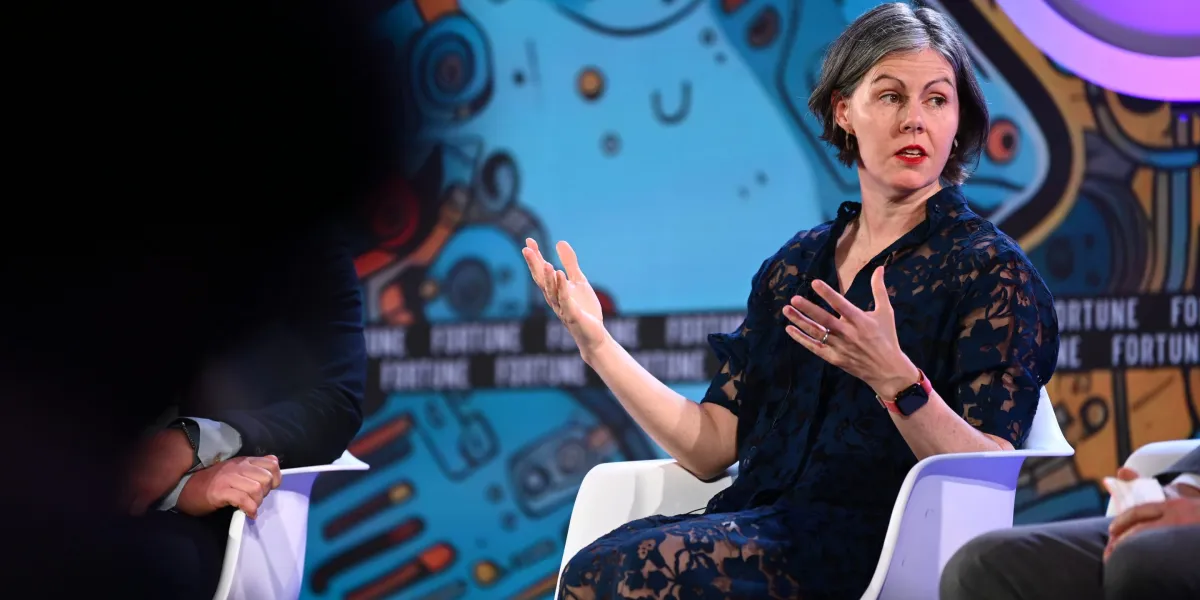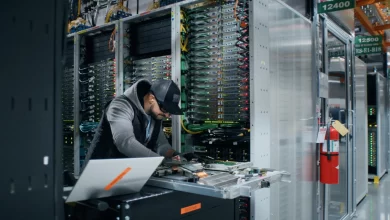Generative AI ‘pours gasoline’ on political misinformation crisis

Good morning.
The conversations at Fortune Brainstorm AI in London this week were mostly optimistic glimpses into how technology will improve our businesses, our lives and our health. Olivier Oullier, co-founder and CEO of Inclusive Brains, ended the event with a fascinating look at how a brain-computer interface will help a quadriplegic carry the Olympic torch later this year.
But the darkest moment of the two days, in my view, was a conversation that I led on the effects of AI on elections and democracy. The speakers, who had deep experience in U.S., U.K., and European politics, noted that we’ve already lived through a decade or more of deteriorating trust in the information available around elections. And generative AI carries the capacity, as one said, to supercharge that misinformation. Some excerpts:
“The real problem is this sense that we are moving further and further into different tribes, into our own filter bubbles, and AI can come along and magnify and amplify that and drive people into an environment where there are their own alternative facts and they are split.”
—Craig Oliver, global co-head, strategy and reputation, FGS Global
“In the short run, the power of AI is a massive exponential amplifier. And if you have no quality control, which I’d say we don’t at the moment, then you have the capacity to amplify misinformation at a faster speed.”
—Tara McGuinness, founder and executive director, New Practice Lab
“You can actually have AI do the targeting and AI do the messaging and the delivery of the message. I think that is powerful and it is quite dystopian. It pours gasoline on it.”
—Julius van de Laar, political strategist, Van De Laar Campaigning
While the panelists were pessimistic about the short-term, they agreed that a concerted public effort, involving both regulation and private actions, was needed to keep democracy intact. McGuinness had the following stark message for the assembled executives:
“The project is public trust. If we keep coming back to that, in any aspect of this, whether you are building a health technology company or a media company, that is our collective charge. And it will break us if we don’t all address this.”
You can read more from the conference here. And here’s today’s CEO quote on why Fortune is important to business:
“The world’s biggest challenges are also its greatest opportunities. To have chronicled the most transformative moments in business over nearly 100 years is remarkable. This is where Fortune shines. A united team profiling the influential leaders, news and events shaping our world.”
—Bill McDermott, chairman and CEO, ServiceNow
Other news below.
Alan Murray
@alansmurray
alan.murray@fortune.com
TOP NEWS
United’s quarterly loss
United Airlines reported a net loss of $124 million in the first quarter of the year. The airline blamed a $200 million hit to its earnings after it grounded its Boeing 737 Max 9 planes for three weeks, following the Alaska Airlines incident in early January. United will also convert some of its 737 Max 10 orders to Max 9 planes instead, due to shifting production timelines at Boeing. Fortune
New funding for France’s AI champion
Mistral, one of Europe’s leading AI startups, is in talks with investors for a funding round that would value the company at $5 billion. The most recent funding round valued the startup at $2 billion. Microsoft recently took a small minority stake in Mistral and said it would offer the French company’s models on its Azure cloud service—a deal that has attracted scrutiny from European antitrust regulators. The Information
A Vietnam bailout
The Vietnamese government is mounting an unprecedented $24 billion rescue of Saigon Joint Stock Commercial Bank (SCB), a bank at the center of one of the country’s largest-ever financial fraud cases. The cash injection amounts to a quarter of Vietnam’s total foreign exchange reserves. Last week, Vietnam sentenced real estate tycoon Truong My Lan to death for allegedly siphoning off $12.5 billion in loans from SCB, which she secretly controlled through proxies. Reuters
AROUND THE WATERCOOLER
JPMorgan CEO Jamie Dimon says grandstanding and frivolousness have ruined shareholder meetings. Here’s how CEOs can fix them by Lila MacLellan
Jamie Dimon’s JPMorgan and other North American banks are so far ahead in the AI race that one indexing boss says it’s now a question of ‘Can others catch up?’ by Eleanor Pringle
Dow CEO: My company is a major plastic producer. We must end plastic pollution by Jim Fitterling
The U.S. is reportedly preparing to sue Ticketmaster over the monopolistic behavior that outraged Swifties last year by Sunny Nagpaul
Fed Chair Jerome Powell has an ‘unfriendly’ message for markets: You might not be getting any rate cuts this year by Will Daniel
AI hallucinations will be solvable within a year, ex-Google AI researcher says—but that may not be a good thing: ‘We want them to propose things that are weird and novel’ by Orianna Rosa Royle
This edition of CEO Daily was curated by Nicholas Gordon.
This is the web version of CEO Daily, a newsletter of must-read insights from Fortune CEO Alan Murray. Sign up to get it delivered free to your inbox.




